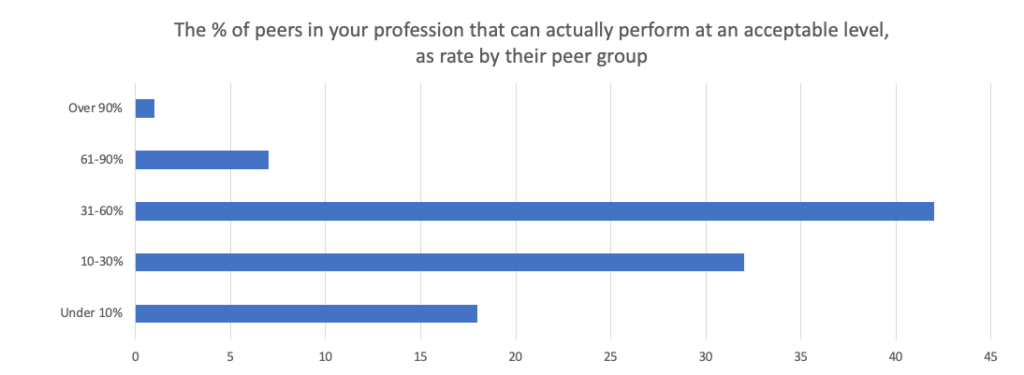I asked this question recently to a number of people. On a normal distribution curve of performance it should look something like this:
-20% are Top Performers
-70% are Average Performers
-10% are Not Performing at all
So, my belief would be if I asked an individual in any professional occupational role, “Tell me what percentage of pros in your field actually know what they are doing?” That I should get a very similar distribution. But I didn’t!
Ask yourself this question right now. How many of your peers, doing the same job you are doing right now, actually know how to do the job?
If you are a plumber, and I put ten plumbers in front of you, are you confident 80-90% can do the job? No? Then how many? If you are an HR Professional, what percentage of your peers are actually good at our profession?
Here was the breakdown I received, in terms of what percentage of peers in your field can actually perform at an acceptable level, as rated by their peer group:
Only 1% of the 394 people surveyed felt like over 90% of people in their field knew what the heck they were doing! 18% of people felt like less than 10% of the people in their field knew what they were doing!
What does this tell us?
Almost everyone overrates their own performance and underrates the performance of those around them doing the same job. It’s really hard for us, in a peer setting, to look at others and go, “yeah, Mary is way better than me!” It’s way easier for us to look at a peer and go, “Oh, Tim? Yeah, he’s an idiot! We don’t let him get near the Happy Meals!”
What I actually tend to find when auditing various functions within an organization is that most people can actually do the job that is requested, when it takes lower-level skills. As you ramp up the skill difficulty is when you see larger variations, which isn’t very comforting.
What are the professions that take high skill? Medical, legal, accounting/finance, technology, etc. Most of these professions, to be really good, you need a combination of a strong education, experience, continual learning, and high attention to detail. Because most of these professions are high paying and have high hiring needs, many people are trying to get into the field, but don’t have all four of the requirements mentioned!
Anyone who has gone through a frustrating medical issue where doctors couldn’t find out what was wrong, only then to go to a more well-known medical facility and immediately get a real diagnosis and treatment, understand this perfectly.
If you’ve been through a difficult legal battle you understand the difference between a $300 an hour lawyer and a $1000 an hour lawyer! There are certain things in life you don’t cheap out on. I don’t want the cheapest brain surgeon or tax accountant or criminal defense lawyer. I’m okay with the cheapest quote to cut my lawn.
The difference in skill and performance levels amongst peers is probably greater than we think. I don’t think 20% of people in the same profession are top performers, it’s probably closer to 1%. We know rock stars in a profession when we see them, and it’s rare. You don’t have 2 or 3 on every team.
That’s why it’s critical that if you have high performing talent, at any level, you do almost anything to retain them. Most will outperform a handful of average to low performing peers doing the exact same job.




